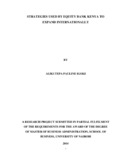| dc.description.abstract | International business comprises all commercial transactions (private and governmental, sales, investments, logistics, and transportation) that take place between two or more regions, countries and nations beyond their political boundaries. The research objective of the study was to determine the strategies used by Equity bank to expand internationally. This study employed a case study on the various strategies used by Equity bank in expanding internationally. The study used mainly the primary data and secondary data. Another primary data source as is observation by the researcher during various visits Equity bank main branch in Kenya and this was also supplemented with the Chief Executive Officer interviews with the media. The interview guide was checked for consistency and data organized through content analysis. Content analysis is the systematic qualitative description of the composition of the object or material of the study. The study established that the Bank did evaluate the expansion strategies by considering the various strategies at their disposal. Evaluation of expansion strategy involved setting up a committee that studied each county unique issues, including the key external environmental factors, Political/Legal, study of existing players and levels of competition, availability of qualified staffing, cost of doing business, investment incentives among others. For the Tanzania market, Equity bank used Greenfield strategy in expanding to the Tanzanian Market. For the Rwanda market, Equity Bank Used green field strategy in expanding to the Rwanda market. The bank started by establishing a single branch in Kigali. For expansion strategies in different EAC market, however, on overall, the strategy of FDI was the best as far as expansion strategies are concerned. Though FDI was employed in the banks expansion into the two markets of South Sudan and Rwanda, the mode of execution in the two markets was very different. In the Uganda market, the Bank used acquisition strategy whereby it acquired a well established microfinance institution in Uganda: Uganda Microfinance. This study recommends that a thorough evaluation of the foreign market needs to be done so as to understand the foreign market dynamic against various expansion strategies so the best expansion strategies are adopted. This would enable successful expansion to such markets. This study also recommends that Bank engaged in employee training and development to build the capacity to deliver quality financial services to its customers in the new established financial markets. | en_US |



